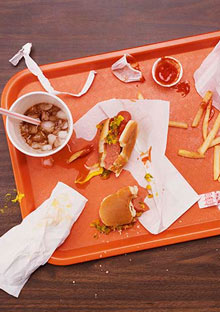How to Break Bread (And Poor Eating Habits)

Photo: © 2009 Jupiterimages Corporation
Carbs are out, then they're in. Eggs can kill you—or save your life. Once and for all, can we just figure out what to put on our plates? That's the question we asked Michael Pollan, the Pied Piper of sustainable eating (or, more simply, the dude of real food).
O: Every day we're bombarded with new nutritional studies aimed at helping us decide what to eat, but you look to the traditional diets of native cultures for guidance. Why? Michael Pollan: People knew how to eat long before they knew what an antioxidant was. The range of different diets human beings can thrive on is incredibly broad. You have the Masai in Africa, who survive on meat, milk, and cow's blood, and are very healthy, and Native Americans in Central America, who eat corn and beans and little meat. And then you've got the Inuit eating seal blubber as part of an almost all-fat diet; traditionally, they've also been quite healthy, with no heart disease or type 2 diabetes to speak of. What does this tell you? That there is no one ideal diet. But there is one diet that gets everyone in trouble, and it happens to be the one our civilization has invented. Populations that eat the Western diet—lots of processed food, lots of calories, few vegetables, fruits, or whole grains—reliably develop a sequence of chronic diseases: heart disease, type 2 diabetes, obesity, and certain cancers. People who get off this Western diet see dramatic improvements in their health.
O: So how do you get off it?
MP: My mantra is seven words: Eat food. Not too much. Mostly plants. In a way, that's all you need to know—so long as you understand that not everything in the supermarket is food. There are a lot of what I call "edible foodlike substances" that don't deserve to be dignified with the label "food." So the first order is coming up with some rules to help you avoid those substances. One is: Don't buy things your grandmother or your great-grandmother—depending on your age—wouldn't recognize as food. She wouldn't know what Splenda with Fiber is, for instance. Another rule: Avoid products with more than five ingredients. And another: Don't eat "foods" with ingredients that a normal person doesn't have in her pantry. Ethoxylated triglycerides? Who cooks with that?
O: But some people can't afford to eat as well as you suggest.
MP: It is hard to make good food choices if you don't have a lot of money, because of the way the system is rigged. The government subsidizes the least healthy calories in the supermarket—those derived from corn and soy. But the more you spend on high-quality food, the less you'll need to spend on healthcare. In 1960, 18 percent of our income went to food, and now it's 9.5 percent. Meanwhile, our spending on healthcare has tripled. Which leads to another rule: You're better off paying the grocer than the doctor.
O: Most of your rules address what food to buy, but some address where to eat it.
MP: If you eat in the car or in front of the television, you eat mindlessly. And you tend to eat more. The rituals surrounding meals remind you that eating is not just about filling the body; it's about communing with other people. The word company comes from com and panis, you know—breaking bread together.
This story is part of O's Live Your Best Year Toolkit
Next: How to fix a broken heart
Michael Pollan's new book, Food Rules: An Eater's Manual (Penguin), contains 64 tips to help anyone eat well.



